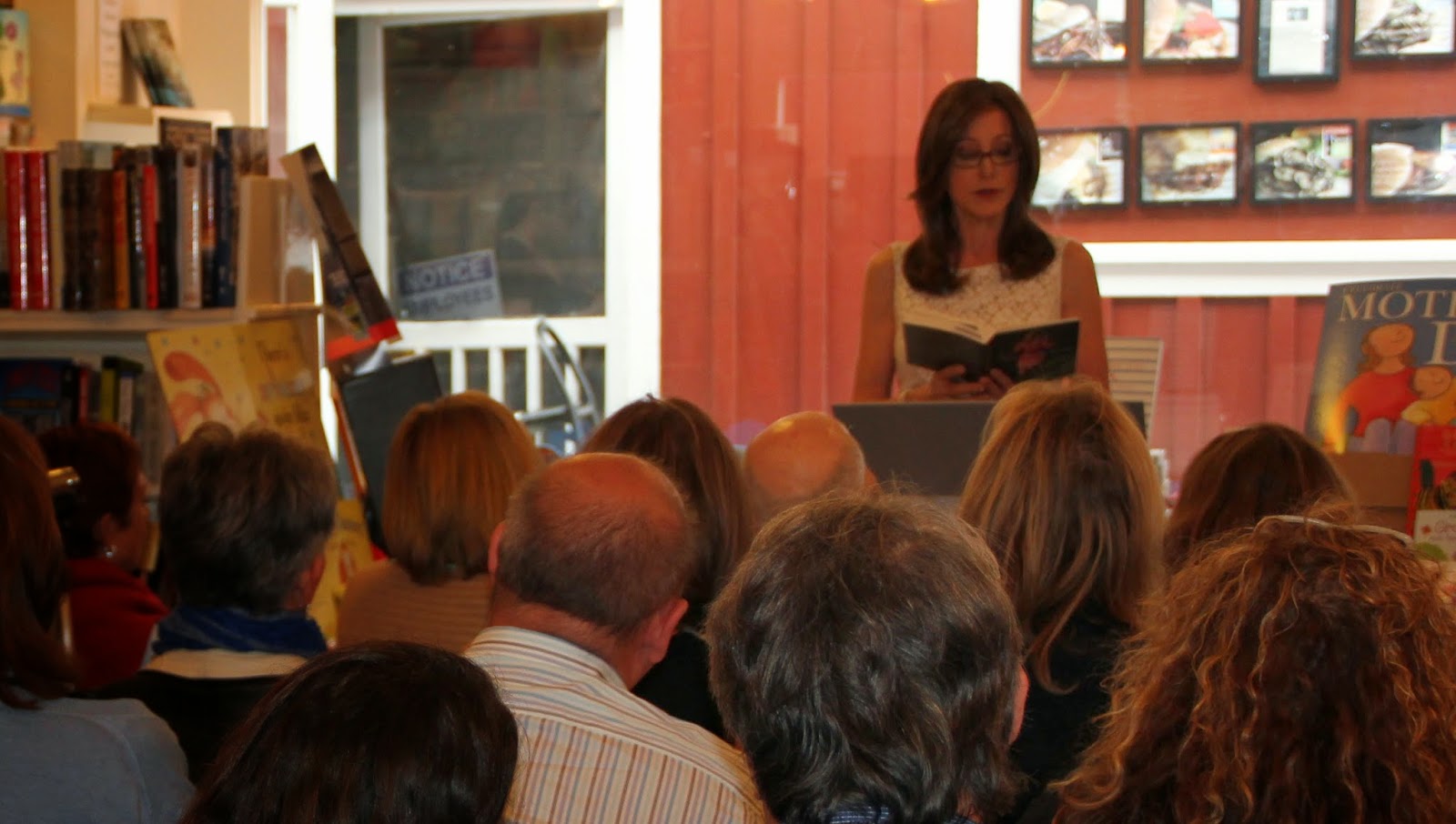Most writers are introverts, spending our days talking to
people in our heads. Even when promote our work on Facebook and Twitter, we can
hide behind the screen. But the time will come when someone asks you to get up
and, that’s right, talk to REAL People. Here’s my advice: Just say YES!
There is nothing more fun than talking about something you
love to do – to people who are interested, Where else will you meet people who truly
like to read or who want to write. These are your people!
Start with baby steps. My first speaking gig was at my
daughter’s kindergarten class, where I taught the basic three act structure.
Jack and Jill went up the hill, Jack fell down and broke his crown, they both
came tumbling after. Sounds simple until one kid - probably like you at that
age - wonders what the heck happened on that hill to make Jack break his crown.
No worries. You can save the advanced
story structure lecture for first graders.
 I began teaching at the UCLA Writers Program soon after my
first novel was published 15 years ago. The classes are filled with all kinds
of professionals, so I spent weeks organizing my notes and creating class
outlines, timing the contents and planning exercises to keep them engaged. The
first quarter, I spoke too fast out of nervousness. The second quarter, an
older gentleman fell asleep during every class. But eventually, through
practice, I got the hang of it. It felt like having my own stand-up comedy act,
where I had a captive audience and everyone laughed at my jokes. I still use
much of same material, always updating for new examples and customizing
lectures for different audiences. The best part is that by teaching about
writing, I always have new thoughts about my own.
I began teaching at the UCLA Writers Program soon after my
first novel was published 15 years ago. The classes are filled with all kinds
of professionals, so I spent weeks organizing my notes and creating class
outlines, timing the contents and planning exercises to keep them engaged. The
first quarter, I spoke too fast out of nervousness. The second quarter, an
older gentleman fell asleep during every class. But eventually, through
practice, I got the hang of it. It felt like having my own stand-up comedy act,
where I had a captive audience and everyone laughed at my jokes. I still use
much of same material, always updating for new examples and customizing
lectures for different audiences. The best part is that by teaching about
writing, I always have new thoughts about my own.
Later, I began speaking at conferences and seminars. Not
only is this a great way to get away from your desk, but it’s an ideal way to
present your latest book after the launch is over. Last week, at a charity
event, I spoke to 300 people about What A Mother Knows. This was by far my
biggest audience so, naturally, I was nervous. My goal was to sell books, to
donate funds to the charity, to make the sponsor glad she invited me, and also,
I wanted to have fun.
 Before me was a comedian who made a joke about the bazaar on
the side of the ballroom – accidentally insulting the audience. Then a young
author with a bestseller talked about himself the whole time and forgot to
describe his book. Finally, it was my turn. Sure enough, my mouth went dry as I
was called up to the podium. But as soon as I put my notes down and looked at
all the faces of people who were truly interested in what I had to say, the
rest came easily. And the line of people waiting for me to sign their books
reflected that. It was my best day yet. The key? It sounds old fashioned, but
it works: Be prepared.
Before me was a comedian who made a joke about the bazaar on
the side of the ballroom – accidentally insulting the audience. Then a young
author with a bestseller talked about himself the whole time and forgot to
describe his book. Finally, it was my turn. Sure enough, my mouth went dry as I
was called up to the podium. But as soon as I put my notes down and looked at
all the faces of people who were truly interested in what I had to say, the
rest came easily. And the line of people waiting for me to sign their books
reflected that. It was my best day yet. The key? It sounds old fashioned, but
it works: Be prepared.
1. Do
your homework. Even for a short talk, it helps to make notes about what you
might want to say. Then write a rough draft. I usually break it down to an
outline, then put it in bullet points. Then copy these onto a notecard. Now you’ve
reviewed the material a few times so all you have to do is….
2. Practice!
Things sound different out loud than they do in your head. Stand up and pretend
the audience is there. Time it. And do it again. This is the boring part, but
it’s the part that makes ALL the difference between panic and poise.
3. Plan
your outfit ahead and decide on every accessory. Make sure it’s all cleaned and
ironed so you don’t rush on that day.
4. Pack
your notes the night before. Add Kleenex, dental floss, blotting powder,
lipstick, and business cards.
5. Arrive
early – check out the room, use the bathroom, and thank the folks who invited
you.
6. Collect
yourself. Breath deeply. Review your notes before you are called.
7. Adapt
– Be familiar with your audience. Think of a comment you can open with that
points out your similarities. Listen to the speaker before you, to see what the
audience responds to and how you can improve on that.
8. Avoid
temptation. Do not drink alcohol, or too
much coffee, or water. Turn off your phone.
9. Smile
…. and have fun.
10. Write
a thank-you note.
You may never be relaxed before a speaking engagement, but
following these tips will help you be successful. Then, you can run back to
your desk and talk to those wonderful people inside your head.
___________________________________


I love your illustration of the three-act structure using "Jack and Jill" (although, as a child, I always wondered why Jack was wearing a crown when he went to fetch water. Was he actually a prince? If so, why didn't he have minions to fetch the water for him? ) The version I've heard, which has been credited to many people, is: "Act One—get your hero character up a tree, Act Two—throw stones/rocks at him, and Act Three—get him down."
ReplyDelete#10 is so important! After all the effort that's required in pulling off a workshop or conference, I think it means so much to the peeps involved to know we appreciate them.
ReplyDeleteLeslie, you sound like a better public speaker than I could ever hope to be! Great tips!! My only exception would be WATER. Yesterday I gave a talk. I forgot my water and nobody offered me any. My mouth was a desert!
ReplyDeleteGreat advice..
ReplyDelete